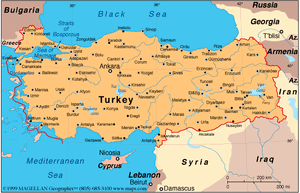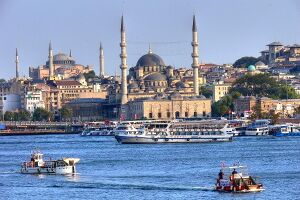Istanbul
| Author:Laxman Burdak, IFS (Retd.) |


Istanbul (Hindi: इस्तम्बुल, कुस्तुन्तुनियां; Turkish: İstanbul), earlier also known as Constantinople, is the largest city in Turkey, constituting the country's economic, cultural, and historical heart. After the founding of the modern Republic of Turkey —the successor state of the Ottoman Empire— the city was renamed Istanbul in 1923.
Variants
- Istanbul (इस्तम्बुल)
- Kustuntunia (कुस्तुन्तुनियां)
- Constantine
- Constantinople
- Konstantinoupolis
Location
Its commercial and historical centre lies in the European part of Eurasia, while about a third of its population lives in the Asian part. With a population of 14.1 million, the city forms the largest urban agglomeration in Europe as well as the largest in the Middle East, and the sixth-largest city proper in the world. Istanbul's vast area of 5,343 square kilometers (2,063 sq mi) is coterminous with Istanbul Province, of which the city is the administrative capital. Istanbul is a transcontinental city, straddling the Bosphorus strait in northwestern Turkey between the Sea of Marmara and the Black Sea.
Various names
The city was originally founded as a Greek colony under the name of Byzantium in the 7th century BC. It took on the name of Konstantinoupolis ("city of Constantine", Constantinople) after its re-foundation under Roman emperor Constantine I, who transferred the imperial capital from its historic base, Rome, to Byzantium in 330 AD and designated his new capital Nova Roma or "New Rome."
The modern Turkish name for the city, İstanbul, derives from the Greek phrase eis tin polin (εις την πόλιν), meaning "into the City" or "to the City". This pattern is used for other Greek cities conquered by the Ottomans (e.g. Izmir, "eis Smyrnen"; Iznik, "eis Nikaian") This name was used in Turkish alongside Kostantiniyye, the more formal adaptation of the original Constantinople, during the period of Ottoman rule, while western languages mostly continued to refer to the city as Constantinople until the early 20th century. After the creation of the Republic of Turkey in 1923, the Turkish government began to formally object to the use of Constantinople in other languages and ask that others use the more common name for the city.
The name "Constantinople" is still used by members of the Eastern Orthodox Church in the title of one of their most important leaders, the Orthodox patriarch based in the city, referred to as "His Most Divine All-Holiness the Archbishop of Constantinople New Rome and Ecumenical Patriarch."
History
Founded on the Sarayburnu promontory around 660 BC as Byzantium, the city now known as Istanbul developed to become one of the most significant cities in history. For nearly sixteen centuries following its reestablishment as Constantinople in 330 AD, it served as the capital of three empires: the Roman and Byzantine (330–1204 and 1261–1453), the Latin (1204–1261), and the Ottoman (1453–1922) empires. It was instrumental in the advancement of Christianity during Roman and Byzantine times, before the Ottomans conquered the city in 1453 and transformed it into an Islamic stronghold and the seat of the last caliphate.
Istanbul's strategic position along the historic Silk Road, rail networks to Europe and the Middle East, and the only sea route between the Black Sea and the Mediterranean have helped foster an eclectic populace, although less so since the establishment of the Republic in 1923. Overlooked for the new capital during the interwar period, the city has since regained much of its prominence. The population of the city has increased tenfold since the 1950s, as migrants from across Anatolia have flocked to the metropolis and city limits have expanded to accommodate them. Arts festivals were established at the end of the 20th century, while infrastructure improvements have produced a complex transportation network.
Early History
While Jordanes, historian of Goths, also wrote Romana about the history of Rome, his best-known work is his Getica, written in Constantinople[1] about AD 551. He mentions the great plague of 542 as having occurred "nine years ago" (Getica 104).
External Links
References
- ↑ "Constantinople is "our city" (Getica 38).

